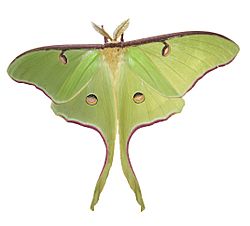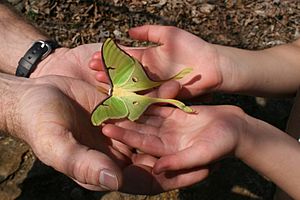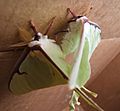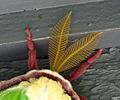American moon moth facts for kids
Quick facts for kids Luna moth |
|
|---|---|
 |
|
| Actias luna, adult | |
| Scientific classification | |
| Kingdom: | |
| Phylum: | |
| Class: | |
| Order: | |
| Family: | |
| Genus: |
Actias
|
| Binomial name | |
| Actias luna Linnaeus, 1758
|
|
The luna moth (Actias luna) is a beautiful type of moth. It belongs to the family called Saturniidae. Many people think the luna moth is the most stunning insect in North America.
Contents
What Does a Luna Moth Look Like?
The luna moth is quite large. Its wingspan (how wide its wings stretch) is about 7.5 to 10.5 centimeters. Its wings are a bright lime-green color. The lower wings have long, flowing tails.
Each wing has a clear, see-through spot. The top edge of the upper wing has a reddish-brown border. Some luna moths might have pinkish borders on the outer edges of their wings. Others might have yellowish borders instead.
Adult luna moths do not have a mouth. This means they cannot eat anything. They use the fat they stored when they were larvae (caterpillars). Because they cannot eat, adult luna moths only live for about one week. They are completely harmless.
Where Do Luna Moths Live?
The luna moth lives across North America. You can find them from Nova Scotia in the east, all the way west to North Dakota. They also live south to Texas and east to Florida.
Luna moths prefer to live in places with lots of trees. They are often found in woodlands and forests.
When Can You See Luna Moths?
The time you can see luna moths depends on where they live. In the northern parts of their range (the area where they live), you can see them from May to July.
In the southern parts of their range, you can see them for a longer time. They fly from March all the way to September.
The Life Cycle of a Luna Moth
The luna moth's eggs are brown. When the eggs hatch, a green caterpillar appears. This caterpillar has bright red spots on its body. It also has two yellow stripes running down each side of its body.
The caterpillar can grow to be about 6.5 centimeters long. The luna moth caterpillar looks a bit like the polyphemus moth (Antheraea polyphemus) caterpillar. But the polyphemus moth caterpillar does not have those yellow stripes.
When it's time to change, the luna moth caterpillar builds a cocoon. This cocoon is made of dead leaves on the ground. The moth spends the winter inside this cocoon. This is called overwintering.
In the northern parts of its range, the luna moth has one brood each year. A brood is a group of offspring (baby moths) born at the same time. In the southern parts of its range, they can have three broods each year.
What Do Luna Moth Caterpillars Eat?
Luna moth caterpillars eat the leaves of certain plants. These plants are called host plants. Here are some of the plants they like to eat:
- Alnus – Alder trees
- Betula – Birch trees
- Carya and Annamocarya – Hickory trees
- Diospyros – Persimmon trees
- Juglans – Walnut trees
- Liquidambar – Sweet gum trees
- Nyssa sylvatica – Black gum trees
- Rhus – Sumac shrubs
Images for kids
See also
 In Spanish: Mariposa luna para niños
In Spanish: Mariposa luna para niños
 | James B. Knighten |
 | Azellia White |
 | Willa Brown |














